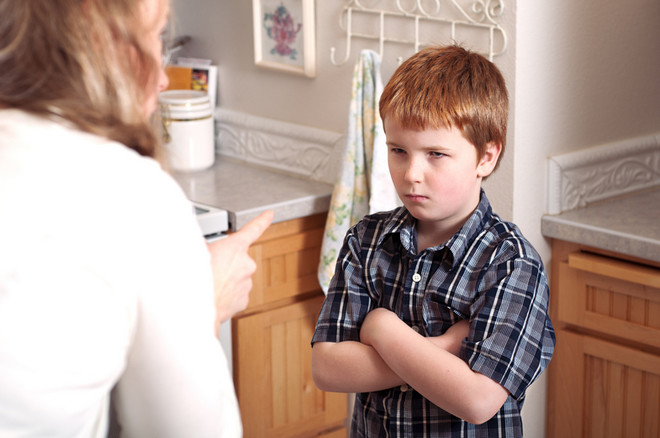There is no single correct answer here, because everythingChildren are different. Some at 6 years old calmly play with a construction set for hours while their mother runs around the store looking for food for dinner, while others at 11 years old are not left home without their parents. Of course, an unprepared child cannot be left alone for half a day and go about his business. In such a matter, measure and gradualness are needed, and first of all - the readiness of the child himself, because leaving him alone against the child's will can develop fear and even cause the formation of a phobia.
Self-reliance test
So before you take that first step onthe path to independence of the child, check his readiness according to the following 6 points: 1. The child is not afraid of the dark and confined spaces, that is, he calmly plays behind a closed door. 2. The child knows the emergency numbers, knows how to use the phone and, if necessary, will be able to dial yours and their numbers. 3. Knows the rules of safe behavior. He does not play with matches, does not open the door to strangers, does not sit on windowsills and does not look out of open windows. 4. He follows the daily routine and your requests calmly, without hysterics. 5. He understands the importance of your busyness and is not offended that he has to be alone. 6. He wants to become an adult faster. Of course, you should not leave a child alone if he is sick, trusting of strangers, hyperactive, curious, disobedient, impressionable or has special developmental signs (mental retardation, cerebral palsy, autism, etc.). And also take the child's word that he will behave carefully and calmly, since it is impossible to predict the behavior of a child while he is left alone.
Behavior Statement
You need to prepare your child for independencefree activity, starting at about four years old. If the baby is very attached to his mother, then it will be difficult for him to be left alone in the room even for half an hour. So, this is exactly the point from which you need to start. As soon as you notice that your child is enthusiastically playing for more than 30 minutes and does not look around for his mother, and especially does not call her every 5 minutes, it means that he has grown up a little and is quite ready to occupy himself with the game for a long time. Leaving the house, leaving the child alone, can be done starting at about 6 years old, and do this for short periods of time, for example, for 10-15 minutes to walk the dog, run to a neighbor for flour or go down to the yard with garbage. Over time, the number of minutes that the child is left home alone can be increased, but only on one condition - always be punctual. If you promised your son or daughter to come in 30 minutes, exactly at 18:00, then you should do so so that he/she does not develop anxiety: “What if something happened to mom?” Upon returning home, always ask what the child was doing, praise him/her for courage and curiosity or creativity, if, for example, he/she read a book or made an applique in your absence. And do not scold him/her for the mess, perhaps, being left alone, he/she decided to play pirate and looked for treasure in the apartment, imagining that he/she was alone on a desert island. If you do not force events and strictly adhere to the plan, then already at the age of seven the child can spend several hours at home alone
What a child must know
 Photo: getty.comIf you finally realized that you are ready to leave the child alone and he also wants very much to become an adult today, be sure to give a final briefing. You can even get a notebook where you write the basic rules of behavior (if he can read) or draw them, and he will put a sign of familiarization on each one. So, what should the child be reminded and made to his mother? Check if he remembers the names of all family members, home address and phone number, as well as parents' phone numbers. If the child has a mobile phone, write down the numbers of all relatives and put on a quick dial. Tell us about the emergency services and leave their phones, explaining how to talk with the operators. If you are friends with neighbors, leave them a spare key and tell them that today your child has stayed home alone.4. Remind that you do not need to have long conversations with strangers on the phone and with those who called the door. The answer should be short: "Mom is busy, call, come back later." 5. Do not leave open windows at home. And again, tell us about the danger of sticking out of them. Remove far away temptations - matches, medications, household chemicals, lighters, alcohol. Close the gas. Leave the snack foods on the table. If the child knows how to use a microwave oven, then you must be sure that the wiring is correct. And of course do not show your child your excitement. Even if you are very, very afraid, he should not know about it. Trust him.7. Call, ask what he is doing now, what the cartoon is looking at or what game is playing, what mood he has and what "delicious" he expects from his mother. Sooner or later all the children will be left alone. Be attentive to the emotional state of the child when you return, and be sure to be interested in how he spent time.
Photo: getty.comIf you finally realized that you are ready to leave the child alone and he also wants very much to become an adult today, be sure to give a final briefing. You can even get a notebook where you write the basic rules of behavior (if he can read) or draw them, and he will put a sign of familiarization on each one. So, what should the child be reminded and made to his mother? Check if he remembers the names of all family members, home address and phone number, as well as parents' phone numbers. If the child has a mobile phone, write down the numbers of all relatives and put on a quick dial. Tell us about the emergency services and leave their phones, explaining how to talk with the operators. If you are friends with neighbors, leave them a spare key and tell them that today your child has stayed home alone.4. Remind that you do not need to have long conversations with strangers on the phone and with those who called the door. The answer should be short: "Mom is busy, call, come back later." 5. Do not leave open windows at home. And again, tell us about the danger of sticking out of them. Remove far away temptations - matches, medications, household chemicals, lighters, alcohol. Close the gas. Leave the snack foods on the table. If the child knows how to use a microwave oven, then you must be sure that the wiring is correct. And of course do not show your child your excitement. Even if you are very, very afraid, he should not know about it. Trust him.7. Call, ask what he is doing now, what the cartoon is looking at or what game is playing, what mood he has and what "delicious" he expects from his mother. Sooner or later all the children will be left alone. Be attentive to the emotional state of the child when you return, and be sure to be interested in how he spent time.
And how are they?
It turns out that in some states of America evenA 14-year-old teenager cannot be left alone. And if the parents have no way to take him with them, then there is only one way out - to leave him with a nanny, otherwise this is a violation of the child's rights and can lead to legal proceedings. Measures against parents have been tightened in many European countries, where finding a child who has not yet turned 12 alone can lead to his removal from the family by social services.









